动词-ing形式小结
- 格式:rtf
- 大小:69.28 KB
- 文档页数:12
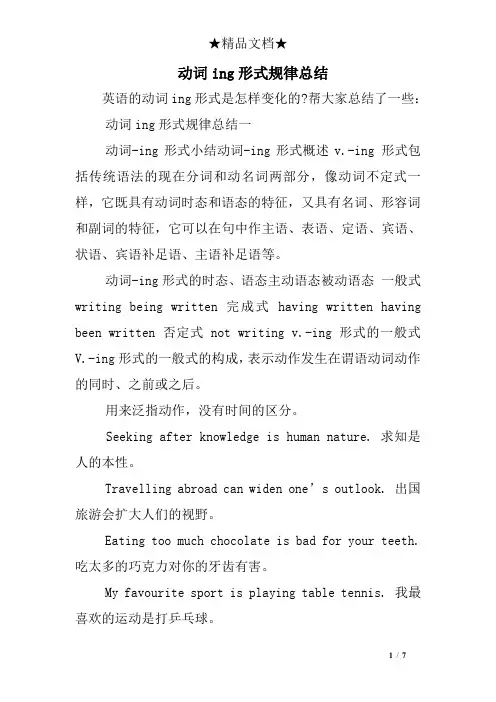
动词ing形式规律总结英语的动词ing形式是怎样变化的?帮大家总结了一些:动词ing形式规律总结一动词-ing形式小结动词-ing形式概述v.-ing 形式包括传统语法的现在分词和动名词两部分,像动词不定式一样,它既具有动词时态和语态的特征,又具有名词、形容词和副词的特征,它可以在句中作主语、表语、定语、宾语、状语、宾语补足语、主语补足语等。
动词-ing形式的时态、语态主动语态被动语态一般式writing being written 完成式 having written having been written 否定式 not writing v.-ing形式的一般式V.-ing形式的一般式的构成,表示动作发生在谓语动词动作的同时、之前或之后。
用来泛指动作,没有时间的区分。
Seeking after knowledge is human nature. 求知是人的本性。
Travelling abroad can widen one’s outlook. 出国旅游会扩大人们的视野。
Eating too much chocolate is bad for your teeth. 吃太多的巧克力对你的牙齿有害。
My favourite sport is playing table tennis. 我最喜欢的运动是打乒乓球。
行为与主要动作同时发生,表示伴随。
The students came into the classroom laughing and talking. 学生们又说又笑地走进了教室。
As she saw me,she came over smiling. 她看到我时,笑容可掬地走过来。
Doing the washing up,Connie was planning her holiday. 康妮在洗碗的时刻盘算着怎样度假。
行为在主要动作之前或之后。
Antonio remembered sending his mother an email three times last month. 安东尼记得上个月给他母亲发了三次电子邮件.(在前) Mr. Lee went out shutting the door behind him. 李先生出去后将门随手关上。
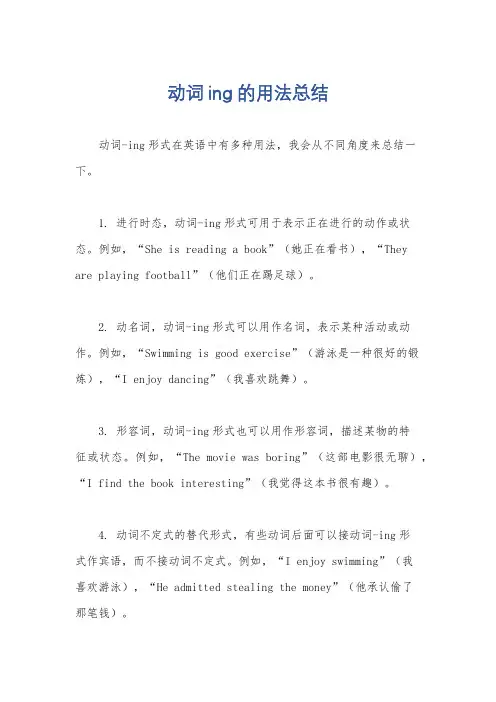
动词ing的用法总结动词-ing形式在英语中有多种用法,我会从不同角度来总结一下。
1. 进行时态,动词-ing形式可用于表示正在进行的动作或状态。
例如,“She is reading a book”(她正在看书),“They are playing football”(他们正在踢足球)。
2. 动名词,动词-ing形式可以用作名词,表示某种活动或动作。
例如,“Swimming is good exercise”(游泳是一种很好的锻炼),“I enjoy dancing”(我喜欢跳舞)。
3. 形容词,动词-ing形式也可以用作形容词,描述某物的特征或状态。
例如,“The movie was boring”(这部电影很无聊),“I find the book interesting”(我觉得这本书很有趣)。
4. 动词不定式的替代形式,有些动词后面可以接动词-ing形式作宾语,而不接动词不定式。
例如,“I enjoy swimming”(我喜欢游泳),“He admitted stealing the money”(他承认偷了那笔钱)。
5. 表示原因或条件,动词-ing形式可以用来表示原因或条件。
例如,“Being tired, she went to bed early”(因为累了,她早早就上床睡觉了),“Without studying, you won't pass the exam”(不学习的话,你就通不过考试)。
总的来说,动词-ing形式在英语中有多种用法,包括进行时态、动名词、形容词、动词不定式的替代形式以及表示原因或条件等。
掌握这些用法可以帮助我们更准确地理解和运用动词-ing形式。
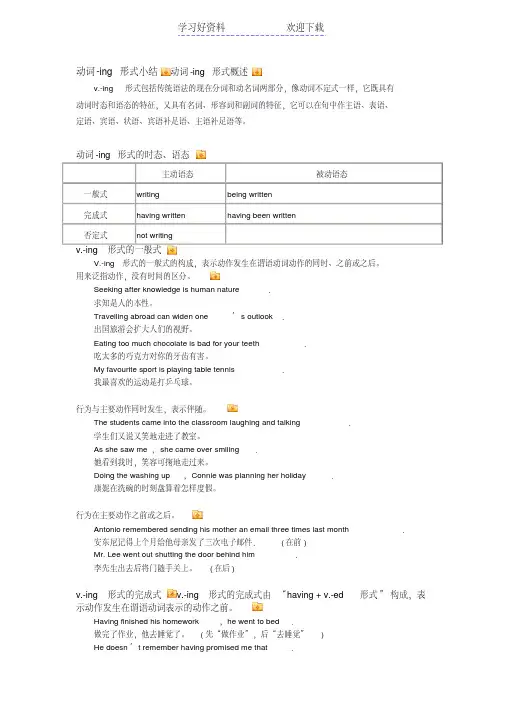
动词-ing形式小结动词-ing形式概述v.-ing 形式包括传统语法的现在分词和动名词两部分,像动词不定式一样,它既具有动词时态和语态的特征,又具有名词、形容词和副词的特征,它可以在句中作主语、表语、定语、宾语、状语、宾语补足语、主语补足语等。
动词-ing形式的时态、语态主动语态被动语态一般式writing being written完成式having written having been written否定式not writingv.-ing形式的一般式V.-ing形式的一般式的构成,表示动作发生在谓语动词动作的同时、之前或之后。
用来泛指动作,没有时间的区分。
Seeking after knowledge is human nature.求知是人的本性。
Travelling abroad can widen one’s outlook.出国旅游会扩大人们的视野。
Eating too much chocolate is bad for your teeth.吃太多的巧克力对你的牙齿有害。
My favourite sport is playing table tennis.我最喜欢的运动是打乒乓球。
行为与主要动作同时发生,表示伴随。
The students came into the classroom laughing and talking.学生们又说又笑地走进了教室。
As she saw me,she came over smiling.她看到我时,笑容可掬地走过来。
Doing the washing up,Connie was planning her holiday.康妮在洗碗的时刻盘算着怎样度假。
行为在主要动作之前或之后。
Antonio remembered sending his mother an email three times last month.安东尼记得上个月给他母亲发了三次电子邮件.(在前)Mr. Lee went out shutting the door behind him.李先生出去后将门随手关上。
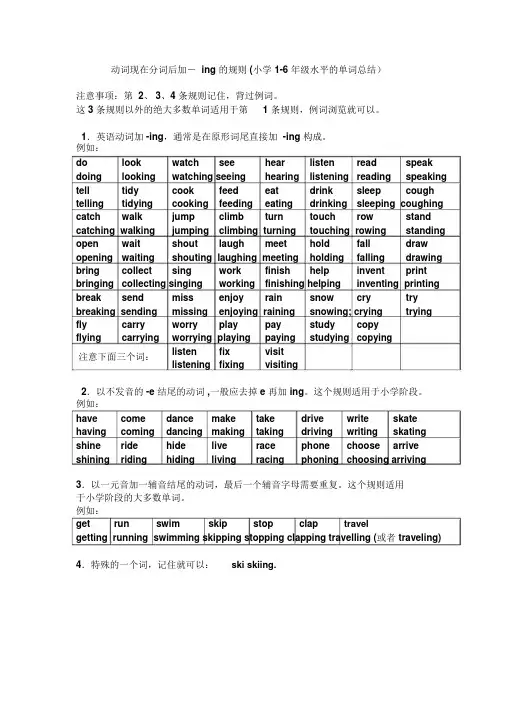
动词现在分词后加- ing 的规则 (小学 1-6 年级水平的单词总结)注意事项:第 2、 3、4 条规则记住,背过例词。
这 3 条规则以外的绝大多数单词适用于第 1 条规则,例词浏览就可以。
1.英语动词加 -ing,通常是在原形词尾直接加 -ing 构成。
例如:do look watch see hear listen read speak doing looking watching seeing hearing listening reading speaking tell tidy cook feed eat drink sleep cough telling tidying cooking feeding eating drinking sleeping coughing catch walk jump climb turn touch row stand catching walking jumping climbing turning touching rowing standing open wait shout laugh meet hold fall draw opening waiting shouting laughing meeting holding falling drawing bring collect sing work finish help invent print bringing collecting singing working finishing helping inventing printing break send miss enjoy rain snow cry try breaking sending missing enjoying raining snowing; crying tryingfly carry worry play pay study copyflying carrying worrying playing paying studying copying注意下面三个词:listen fix visit listening fixing visiting2.以不发音的 -e 结尾的动词 ,一般应去掉 e 再加 ing。
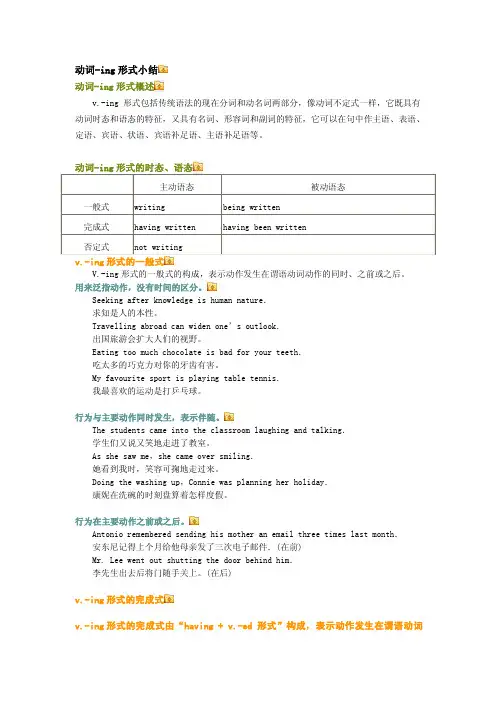
-ing-ingv.-ingV.-ingSeeking after knowledge is human natureTravelling abroad can widen one's outlookEating too much chocolate is bad for your teethMy favourite sport is playing table tennisThe students came into the classroom laughing and talkingAs she saw meshe came over smilingDoing the washing upConnie was planning her holidayAntonio remembered sending his mother an email three times last month ()Mr.Lee went out shutting the door behind him()v.-ingv.-ing"having+v.-ed"Having finished his homeworkhe went to bed("""")He doesn't remember having promised me thatShe regretted having missed the filmI remember having heard you speak on that subjectI could not recall having heard anyone say that beforeThat weekendhaving watched TV to a whileI went to the library to borrow some new novelsHaving realized why he had failed in the examhe has made up his mind to work harder from now onThe decision having been madethe next problem was how to make a good plan v.-ingv.-ing"being+v.-ed"v.-ingWhat's the subject being discussed at the meeting??Being asked to answer the questionshe felt a little nervousThe large building being built(=which is being built)will be our school libraryThe highway being built will lead to Tanggu portI still remember being taken to Hangzhou when I was a childHe did it without being askedThis problem is far from being settledThe squirrel was luckyIt missed being caughtHe hated being laughed atHe narrowly missed being seriously injuredYou'll find the topic being discussed everywherev.-ing"having been+v.-ed"Having been given such a good chancehow could you not cherish it at all??Having been invitedhe went to Japan to attend the conferenceThe decision having been madethe next problem was how to make a good planv.-ingv.-ing not v.-ingThe boy made his father angry by not taking his medicineI regret not being able to help youNot having received an answerhe decided to write againNot knowing his address and telephone numberwe couldn't get in touch with himI'm sorry for not being present at your party in timeI felt sorry for not having done the work wellI'm sorry for not having telephoned you beforeShe hated herself for not having worked hardTrying without success is better than not trying at all-ingv.-ingSeeing is believing.()()Playing table tennis is his favourite sport.Crossing the Atlantic by plane takes only a few hours.Talking is easier than doing.it v.-ingIt's no use talking about itI don't think it's much good writing to him.It's no use crying over spilt milk()()v.-ingv.-ingv.-ing"There be no+v.-ing"There's joking about such mattersThere's no telling what he's going to do.No smokingNo parkingv.-ingTom's marrying Jenny made his father angryIt's no use your pretending that you didn't know the rulesHer going there won't do any harmv.-ingv.-ingv.-ing A v.-ing B.v.-ingA avoid consider delay dislike enjoy escape excuse finish giveup cannot help imagine include keep(on)mind miss practise put off suggest He enjoys listening to light musicThe young man is considering changing his jobI'm sorry I missed seeing you while in ShanghaiWould you mind filling out this form??My father gave up smoking last yearMother suggested going to Beijing by airB begin cannot bearceasecontinueforget hate likelovemean planpreferproposeregretrememberstartstoptrybegin start continue cease cannot bear hate like love prefer propose v.-ingThe students began writing/to write compositions.She cannot bear to be laughed at./being laughed at.The boys love to play/playing football.would likelovepreferhateI'd like to buy a motor carI'd prefer to walk this morningI'd hate to disappoint herHe's beginning to learn JapaneseWe're proposing to start at seven7begin seeunderstandknowbelieveShe began to understand she was wrongI began to believe what he saidbeginSuddenly it began to rainneedwantrequire v.-ingv.-ingMy recorder needswantsrequires mending./to be mended.His letter requires answering/to be answered immediately.rememberforgetregret v.-ingv.-ingI remember posting the letter("""")I must remember to post the letter("""'')I've forgotten returning the book to the library("")I've forgotten to return the book to the library("")trycannot help,mean,stopgo on v.-ingThey stopped to talk.()()They stopped talking(v.-ing)He tried to do the work better.He tried doing the work in another way.Do you mean to tell me that??That'll mean waiting for some more timeI couldn't help to finish that job.I couldn't help laughing when I heard the news.He went on to point out mistakes in the paper.() He went on pointing out mistakes in the paper.()(1)it v.-ing v.-ingShe found it no use arguing with himDo you consider it any good trying again??(2)v.-ing(finish practise)v.-ing()Do you mind me(my)smoking??We are considering him(his)going therev.-ingAfter winning the competitionshe was ranked first in the world in women's figure skatingAt last he succeeded in performing his taskHis Job consists of gathering information and writing articlesI'm surprised at finding the house emptyI'm sorry for giving you so much troubleHowWhat about going to the cinema??Nothing can stop them from falling in love with each otherTom is angry about not being invited to the partyWe had no trouble in finding his houseI'm glad to have this opportunity of coming to visit your countryEveryone thinks of changing the worldbut no one thinks of changing himselfv.-ingI heard him singing a popular song in the next roomWe can see steam rising from the wet clothes1fee find get hear keep see watch notice v.-ingHe was heard singing a popular song in the next roomSteam can be seen rising from the wet clothes2v.-ingv.-ingI saw her come in("")I saw her coming in("")v.-ingMy favourite sport is playing table tennis.What interests me is living and dying for what one lovesReading is learningv.-inlgv.-ing(v.-ing )Their job is building houses.Our task now is to build a housev.-ingThere's a swimming pool in our school(a swimming pool a pool for swimming)He is in the reading room.(the reading room the room for reading)v.-ingv.-inga sleepingbaby=a baby who is sleepingsleeping v.-ing babya runningriver=a river that is runninga waitingcara flyingfisha barkingdoga cleaningwomana sleepingvolcanoa firingsquadan astonishingspeeda touchingstorya shiningexamplean everlastingfriendshipv.-ingrolling waves falling leaves galloping horses coming week touching story rising sun ruling clique striking contrast raging flames biting windv.-inga hard-working Chinese peoplefar-reaching significancehigh-sounding wordsan ocean-going destroyeran easy-going manthe theatre-going publicearth-shaking changesepoch-making eventv.-ingv.-ingv.-ingAsleeping car=a car for sleeping aswimming pool=a pool for swimming areading room=a room for reading aliving room=a room for living atyping paper=a paper for typing awriting desk=a desk for writingv.-ingv.-ingrunning shoesstudying methodwaiting roomdriving permitreading materialssmoking roomdancing hallworking hoursv.-ing v.-ing Caring mothers know that brain needs extra nutritionA diet lacking in nutritional value won't keep a person healthyThere were a lot of boy students playing football on the football fieldv.-ingHe sat there smoking()She stood on the beachgazing at the ocean()Watching(=When he watched)an apple falling down from the tree Newton had an inspiration()Looking down from the top of a cliffyou will feel dizzy()Not having received an answerhe decided to write again()In1492Columbus commanded a small fleet across the Atlanlic Ocean searching for a sea route to Asia1492()Water can absorb and release a lot of heat without big changes in its tem-peraturethus creating a stable environment()v.-ingv.-ingThe room should be given a good cleaningWho did the recording??I'll do some shoppingreading this afternoon()Please send our greetings to themv.-ingv.-ingSeeing is believing.()My favourite sport is swimming.This is not saying very much.I think that's putting it rather mildly.v.-ingv.-ing v.-ingamusing,annoying,boring, charming,comforting,confusing,disappointing,discouraging,disturbing, embarrassing,encouraging,exciting,fascinating,interesting,inviting,missing, misleading,obliging,pleasing,pressing,promising,puzzling,refreshing, shocking,striking,surprising,vexingv.-ingPrices are stable and the market is flourishing.It's boring sitting at home with nobody to talk to.I suppose it's a bit embarrassing.The flowers look even more charming after the rain.v.-ing v.-ingHis hobby is collecting stamps.He is collecting stamps.The present situation is encouraging.The present situation is encouraging the people all over the world in their fight against hegemonism.go fishing v.-inggo,come sit,stand v.-ing( )Jim's gone fishing.She came running to meet me.We sat telling stories to the children.He stood watching the soccer match.v.-ingv.-ing v.-ingv.-ingv.-ing v.-ingWe consider meeting her foolish.we consider it foolish meeting her.We consider it foolish to meet her.v.-ingv.-ingacknowledge,avoid,consider,contemplate,defer,delay,dislike,enjoy, escape,excuse,evadefacilitate,fancyfavourfinish,give up,cannot help, imagine,include,keep(on),don't mind,misspostponepractiseput off,resent, resist,risk,cannot stand,suggest1Peter received a letter just now________his grandma would come to see him soonAsaid B says Csaying D.to say2.--Come onplease give me some ideas about the project.--SorryWith so much work________my mindI almost break down.Afilled B filling Cto fill D being filled3.--Do you think that housing price will keep________in the years to come?--SorryI have no ideaA.lifting up Bgoing up Cbringing up Dgrowing up4As the light turned green I stood for a moment not________,and asked myself what Iwas going to doAmoved B moving Cto move Dbeing moved5.We often provide our children with toysfootballs or basketballs________ that allchildren like these thingsAthinking Bthink Cto think Dthought6The wild flowers looked like a soft orange blanket________the desert Acovering Bcovered Ccover Dto cover7If you think that treating a woman well means always________her permission forthingsthink againAgets Bgot Cto get Dgetting8After he became conscioushe remembered________and________on the head with a rodAto attackhit Bto be attackedto be hitCattackingbe hit Dhaving been attackedhit9Don't sit there________nothingCome and help me with this tableAdo Bto do Cdoing D.and doing10My cousin came to see me from the country________me a full basket of fresh fruitsAbrought Bbringing Cto bring Dhad brought11Whenever he was asked why he was late for classhe would answer carelessly always________the same thingAsaying Bsaid Cto say Dhaving said12--There is a story here in the paper about a110-year-old man --My goodness!I can't imagine________that oldAto be Bto have been Cbeing Dhaving been13It is difficult to imagine his________the decision without any considerationAaccept Baccepting Cto accept Daccepted14I was told that there were about50foreign students________Chinese in the schoolmost were from GermanyAstudyof whom Bstudyof themCstudyingof them Dstudyingof whom15When________different cultureswe often pay attention only to the differenceswithout noticing the many similaritiesAcompared Bbeing comparedCcomparing Dhaving compared1C received AB v.-ingv.-ingC2B with withADv.-ingB""3B keep v.-ing""lift up go up bringup grow up Bhousing price B4B v.-ing v.-ingstoodv.-ing moving 5Av.-ing think v.-ing6Av.-ing blanket coverlike v.-ing7Dmean doing sth""mean to do sth" "8D After he became conscious remember doing" "()having been attacked andhit attack hit v.-ed hit9Cv.-ing10Bv.-ing""v.-ing v.-edcame D11Av.-ing he v.-ingBandC D12Cimagine v.-ing""" "13B imagine v.-ing enjoyappreciate insist on14D v.-ing D5015C"when+v.-ing" v.-ingwecomparev.-ing。
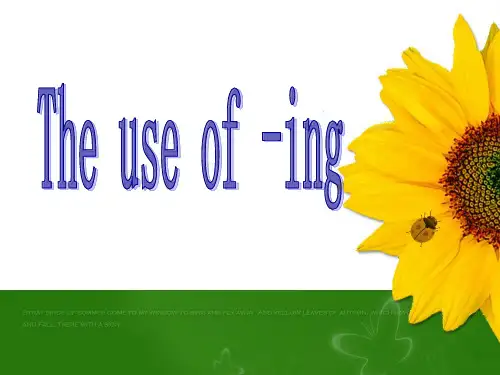
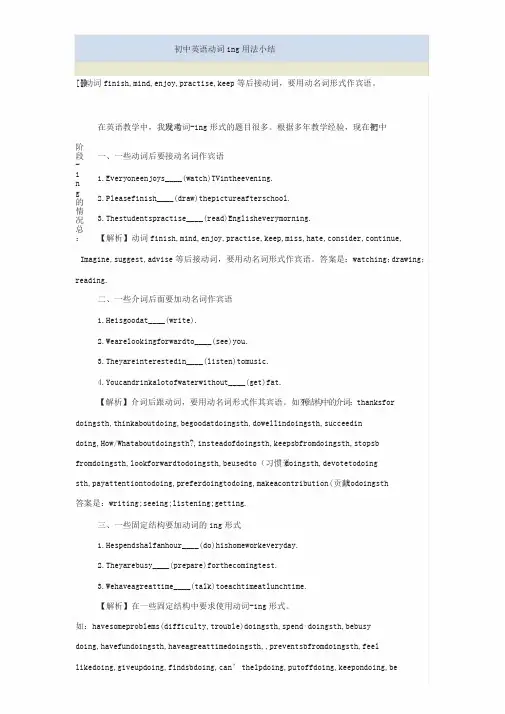
初中英语动词ing用法小结[导读]动词finish,mind,enjoy,practise,keep等后接动词,要用动名词形式作宾语。
在英语教学中,我发现考动词-ing形式的题目很多。
根据多年教学经验,现在把初中阶段-i n g 的情况总:一、一些动词后要接动名词作宾语1.Everyoneenjoys____(watch)TVintheevening.2.Pleasefinish____(draw)thepictureafterschool.3.Thestudentspractise____(read)Englisheverymorning.【解析】动词finish,mind,enjoy,practise,keep,miss,hate,consider,continue,Imagine,suggest,advise等后接动词,要用动名词形式作宾语。
答案是:watching;drawing;reading.二、一些介词后面要加动名词作宾语1.Heisgoodat____(write).2.Wearelookingforwardto____(see)you.3.Theyareinterestedin____(listen)tomusic.4.Youcandrinkalotofwaterwithout____(get)fat.【解析】介词后跟动词,要用动名词形式作其宾语。
如下列结构中的介词:thanksfor doingsth,thinkaboutdoing,begoodatdoingsth,dowellindoingsth,succeedindoing,How/Whataboutdoingsth?,insteadofdoingsth,keepsbfromdoingsth,stopsb fromdoingsth,lookforwardtodoingsth,beusedto(习惯于)doingsth,devotetodoingsth,payattentiontodoing,preferdoingtodoing,makeacontribution(贡献)todoingsth答案是:writing;seeing;listening;getting.三、一些固定结构要加动词的ing形式1.Hespendshalfanhour____(do)hishomeworkeveryday.2.Theyarebusy____(prepare)forthecomingtest.3.Wehaveagreattime____(talk)toeachtimeatlunchtime.【解析】在一些固定结构中要求使用动词-ing形式。
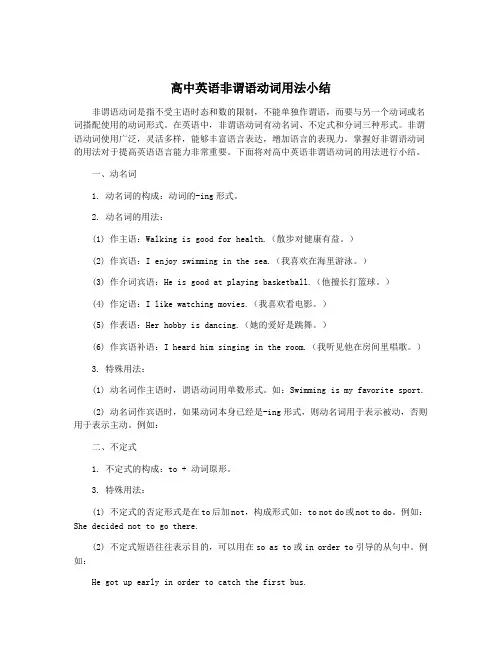
高中英语非谓语动词用法小结非谓语动词是指不受主语时态和数的限制,不能单独作谓语,而要与另一个动词或名词搭配使用的动词形式。
在英语中,非谓语动词有动名词、不定式和分词三种形式。
非谓语动词使用广泛,灵活多样,能够丰富语言表达,增加语言的表现力。
掌握好非谓语动词的用法对于提高英语语言能力非常重要。
下面将对高中英语非谓语动词的用法进行小结。
一、动名词1. 动名词的构成:动词的-ing形式。
2. 动名词的用法:(1) 作主语:Walking is good for health.(散步对健康有益。
)(2) 作宾语:I enjoy swimming in the sea.(我喜欢在海里游泳。
)(3) 作介词宾语:He is good at playing basketball.(他擅长打篮球。
)(4) 作定语:I like watching movies.(我喜欢看电影。
)(5) 作表语:Her hobby is dancing.(她的爱好是跳舞。
)(6) 作宾语补语:I heard him singing in the room.(我听见他在房间里唱歌。
)3. 特殊用法:(1) 动名词作主语时,谓语动词用单数形式。
如:Swimming is my favorite sport.(2) 动名词作宾语时,如果动词本身已经是-ing形式,则动名词用于表示被动,否则用于表示主动。
例如:二、不定式1. 不定式的构成:to + 动词原形。
3. 特殊用法:(1) 不定式的否定形式是在to后加not,构成形式如:to not do或not to do。
例如:She decided not to go there.(2) 不定式短语往往表示目的,可以用在so as to或in order to引导的从句中。
例如:He got up early in order to catch the first bus.We worked hard so as to finish the task on time.三、分词掌握好非谓语动词的用法对于学习英语语言至关重要。
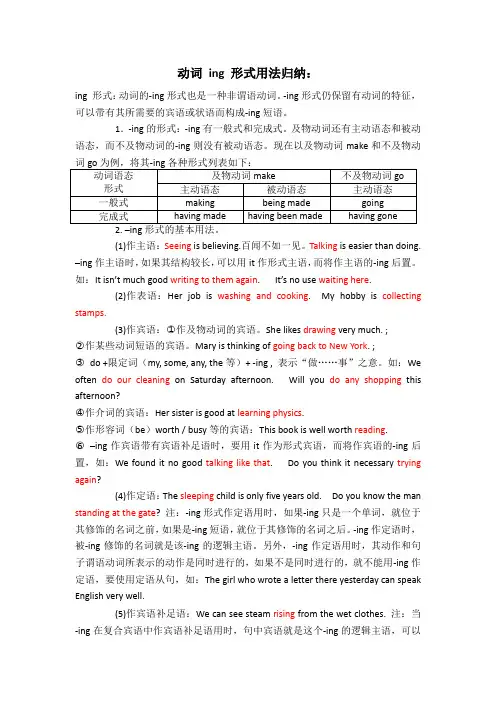
动词ing 形式用法归纳:ing 形式:动词的-ing形式也是一种非谓语动词。
-ing形式仍保留有动词的特征,可以带有其所需要的宾语或状语而构成-ing短语。
1.-ing的形式:-ing有一般式和完成式。
及物动词还有主动语态和被动语态,而不及物动词的-ing则没有被动语态。
现在以及物动词make和不及物动(1)作主语:Seeing is believing.百闻不如一见。
Talking is easier than doing. –ing作主语时,如果其结构较长,可以用it作形式主语,而将作主语的-ing后置。
如:It isn’t much good writing to them again. It’s no use waiting here.(2)作表语:Her job is washing and cooking. My hobby is collecting stamps.(3)作宾语:○1作及物动词的宾语。
She likes drawing very much. ;○2作某些动词短语的宾语。
Mary is thinking of going back to New York. ;○3do +限定词(my, some, any, the等)+ -ing , 表示“做……事”之意。
如:We often do our cleaning on Saturday afternoon. Will you do any shopping this afternoon?○4作介词的宾语:Her sister is good at learning physics.○5作形容词(be)worth / busy等的宾语:This book is well worth reading.○6–ing作宾语带有宾语补足语时,要用it作为形式宾语,而将作宾语的-ing后置,如:We found it no good talking like that. Do you think it necessary trying again?(4)作定语:The sleeping child is only five years old. Do you know the man standing at the gate? 注:-ing形式作定语用时,如果-ing只是一个单词,就位于其修饰的名词之前,如果是-ing短语,就位于其修饰的名词之后。
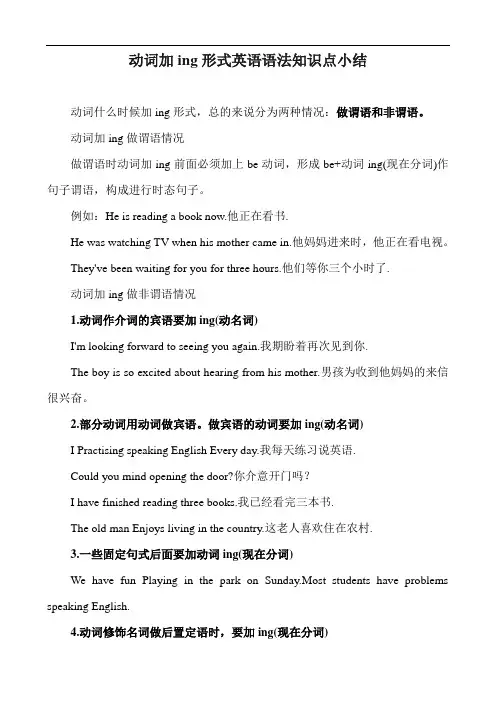
动词加ing形式英语语法知识点小结动词什么时候加ing形式,总的来说分为两种情况:做谓语和非谓语。
动词加ing做谓语情况做谓语时动词加ing前面必须加上be动词,形成be+动词ing(现在分词)作句子谓语,构成进行时态句子。
例如:He is reading a book now.他正在看书.He was watching TV when his mother came in.他妈妈进来时,他正在看电视。
They've been waiting for you for three hours.他们等你三个小时了.动词加ing做非谓语情况1.动词作介词的宾语要加ing(动名词)I'm looking forward to seeing you again.我期盼着再次见到你.The boy is so excited about hearing from his mother.男孩为收到他妈妈的来信很兴奋。
2.部分动词用动词做宾语。
做宾语的动词要加ing(动名词)I Practising speaking English Every day.我每天练习说英语.Could you mind opening the door?你介意开门吗?I have finished reading three books.我已经看完三本书.The old man Enjoys living in the country.这老人喜欢住在农村.3.一些固定句式后面要加动词ing(现在分词)We have fun Playing in the park on Sunday.Most students have problems speaking English.4.动词修饰名词做后置定语时,要加ing(现在分词)There is a boy Crying over there.I felt something moving in the house.I heard someone singing in the next room.5.动词做主语和表语时,动词要加ing(动名词)Swimming is very popular in summer.His job is teaching English.综上所述,动词在以上六种情况需要加ing!增强背诵记忆的方法• 勤动手指锻炼手指功能可健脑益智,促进思维。
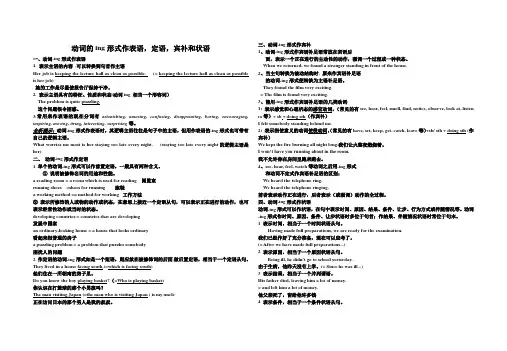
动词的ing形式作表语,定语,宾补和状语一、动词-ing形式作表语1. 表示主语的内容,可以转换到句首作主语Her job is keeping the lecture hall as clean as possible. (= keeping the lecture hall as clean as possible is her job)她的工作是尽量使报告厅保持干净。
2. 表示主语具有的特征、性质和状态(动词ing 相当一个形容词)The problem is quite puzzling.这个问题很令困惑。
3.常用来作表语的现在分词有astonishing, amusing, confusing, disappointing, boring, encouraging, inspiring, moving, tiring, interesting, surprising等。
全析提示:动词-ing形式作表语时,其逻辑主语往往是句子中的主语,但用作表语的-ing形式也可带有自己的逻辑主语。
What worries me most is her staying too late every night. (staying too late every night的逻辑主语是her)二、动词-ing形式作定语1 单个的动词-ing形式可以作前置定语,一般具有两种含义。
①说明被修饰名词的用途和性能。
a reading room = a room which is used for reading 阅览室running shoes =shoes for running 跑鞋a working method =a method for working 工作方法②表示所修饰的人或物的动作或状态,在意思上接近一个定语从句,可以表示正在进行的动作,也可表示经常性动作或当时的状态。
developing countries = countries that are developing发展中国家an ordinary-looking house = a house that looks ordinary看起来很普通的房子a puzzling problem = a problem that puzzles somebody困扰人的问题2 作定语的动词-ing形式如是一个短语,则应放在被修饰词的后面,做后置定语,相当于一个定语从句。
动词ing知识点总结动词ing形式,在英文语法中是一种非常重要的形式,它有多种不同的用法和功能。
在本篇文章中,我们将深入探讨动词ing形式的各种用法和知识点,帮助读者更好地掌握和使用这一语法结构。
一、动词ing形式的基本构成动词ing形式的构成非常简单,大多数情况下是在动词原形的基础上加上ing后缀。
例如:- walk → walking- eat → eating- play → playing但是也有一些特殊的变化规则,比如以“e”结尾的动词要去掉最后的“e”再加上ing,比如:- take → taking- make → making- write → writing还有一些以辅音字母加“ie”结尾的动词,要将“ie”变为“y”再加上ing,比如:- die → dying- lie → lying总的来说,动词ing形式的构成规则比较简单,但需要注意一些特殊变化规则。
二、动词ing的用法动词ing形式具有多种不同的用法和功能,下面将详细介绍每一种用法。
1. 动词ing 作谓语动词动词ing形式可以作为谓语动词,表示正在进行的动作。
例如:- He is reading a book.- They are playing basketball.2. 动词ing 作动名词动词ing形式也可以作为名词使用,这就是动名词。
动名词可以作为主语、宾语、表语、介词宾语等。
例如:- Swimming is good exercise.- I enjoy reading novels.- She is good at singing.3. 动词ing 作形容词动词ing形式还可以作为形容词使用,表示给人或物的特征或状态。
例如:- The movie was boring.- The running water sounds soothing.4. 动词ing 用于进行时态在进行时态中,动词ing形式表示正在进行的动作。
英语动词ing用法归类总结动词的-ing形式也是一种非谓语动词。
-ing形式仍保留有动词的特征,可以带有其所需要的宾语或状语而构成-ing短语。
动词-ing 又分为present participle and gerund. 动名词:由动词变化而来,一方面仍保留着动词的某些特征,具有动词的某些变化形势,,用以表达名词所不能表达的较为复杂的意念,另一方面动名词在句中用法及功能与名词类同,在句子中可以做主语、宾语。
表语和定语,它可以被副词修饰或者用来支配宾语。
的形式:-ing有一般式和完成式。
及物动词的-ing还有主动式和被动式,而不及物动词的-ing则没有被动式。
现在以及物动词make和不及物动词go为例,将其-ing各种形式列表如下:a. 一般式:V-ing1).动词V-ing形式的一般式可用来泛指一个动作,没有特别的时间意义。
Swimmi ng is her favorite sport. 运动。
游泳是她最喜欢的体育Learning is important to modern life. 学习对现代生活很重要。
2).动词V-ing 形式的一般式可用来表示与谓语动词同时发生的动作。
They went out of the classroom, talking and laughing. 他们有说有笑地走出教室。
3).动词V-ing 形式的一般式有时也可表示在谓语动词的动作之前或之后发生的动作。
I remembered sending him an e-mail last week. 我记得上星期给他发过一份电子邮件。
He suggested taking my daughter to the zoo the next Sunday. 他建议下个星期天带我女儿去动物园。
?b.完成式: having done1.动词V-ing 形式的完成式表示一个已完成的动作,这个动作发生或完成在谓语动词表示的动作之前。
英语语法——动词加ing形式小结附英语学习方法动词什么时候加ing形式,总的来说分为两种情况:做谓语和非谓语。
动词加ing做谓语情况做谓语时动词加ing前面必须加上be动词,形成be+动词ing(现在分词)作句子谓语,构成进行时态句子。
例如:He is reading a book now.他正在看书.He was watching TV when his mother came in.他妈妈进来时,他正在看电视。
They've been waiting for you for three hours.他们等你三个小时了.动词加ing做非谓语情况1.动词作介词的宾语要加ing(动名词)I'm looking forward to seeing you again.我期盼着再次见到你.The boy is so excited about hearing from his mother.男孩为收到他妈妈的来信很兴奋。
2.部分动词用动词做宾语。
做宾语的动词要加ing(动名词)I Practising speaking English Every day.我每天练习说英语.Could you mind opening the door?你介意开门吗?I have finished reading three books.我已经看完三本书.The old man Enjoys living in the country.这老人喜欢住在农村.3.一些固定句式后面要加动词ing(现在分词)We have fun Playing in the park on Sunday.Most students have problems speaking English.4.动词修饰名词做后置定语时,要加ing(现在分词)There is a boy Crying over there.I felt something moving in the house.I heard someone singing in the next room.5.动词做主语和表语时,动词要加ing(动名词)Swimming is very popular in summer.His job is teaching English.综上所述,动词在以上六种情况需要加ing!英语学习方法与习惯日常生活中随时随地练习1、将英语真正融入日常生活。
动词-ing形式小结动词-ing形式概述v.-ing 形式包括传统语法的现在分词和动名词两部分,像动词不定式一样,它既具有动词时态和语态的特征,又具有名词、形容词和副词的特征,它可以在句中作主语、表语、定语、宾语、状语、宾语补足语、主语补足语等。
动词V.-ing形式的一般式表示1)动作发生在谓语动词动作的同时、之前或之后。
用来泛指动作,没有时间的区分。
Seeking after knowledge is human nature.求知是人的本性。
Travelling abroad can widen one’s outlook.出国旅游会扩大人们的视野。
Eating too much chocolate is bad for your teeth.吃太多的巧克力对你的牙齿有害。
My favourite sport is playing table tennis.我最喜欢的运动是打乒乓球。
2)行为与主要动作同时发生,表示伴随。
The students came into the classroom laughing and talking.学生们又说又笑地走进了教室。
As she saw me,she came over smiling.她看到我时,笑容可掬地走过来。
Doing the washing up,Connie was planning her holiday.康妮在洗碗的时刻盘算着怎样度假。
3)行为在主要动作之前或之后。
Antonio remembered sending his mother an email three times last month.安东尼记得上个月给他母亲发了三次电子邮件.(在前)Mr. Lee went out shutting the door behind him.李先生出去后将门随手关上。
(在后)v.-ing形式的完成式v.-ing形式的完成式由“having + v.-ed 形式”构成,表示动作发生在谓语动词表示的动作之前。
动词-ing形式小结动词-ing形式概述v.-ing 形式包括传统语法的现在分词和动名词两部分,像动词不定式一样,它既具有动词时态和语态的特征,又具有名词、形容词和副词的特征,它可以在句中作主语、表语、定语、宾语、状语、宾语补足语、主语补足语等。
动词-ing形式的时态、语态主动语态被动语态一般式 writing being written完成式 having written having been written否定式 not writingv.-ing形式的一般式V.-ing形式的一般式的构成,表示动作发生在谓语动词动作的同时、之前或之后。
用来泛指动作,没有时间的区分。
Seeking after knowledge is human nature.求知是人的本性。
Travelling abroad can widen one’s outlook.出国旅游会扩大人们的视野。
Eating too much chocolate is bad for your teeth.吃太多的巧克力对你的牙齿有害。
My favourite sport is playing table tennis.我最喜欢的运动是打乒乓球。
行为与主要动作同时发生,表示伴随。
The students came into the classroom laughing and talking.学生们又说又笑地走进了教室。
As she saw me,she came over smiling.她看到我时,笑容可掬地走过来。
Doing the washing up,Connie was planning her holiday.康妮在洗碗的时刻盘算着怎样度假。
行为在主要动作之前或之后。
Antonio remembered sending his mother an email three times last month.安东尼记得上个月给他母亲发了三次电子邮件.(在前)Mr. Lee went out shutting the door behind him.李先生出去后将门随手关上。
(在后)v.-ing形式的完成式v.-ing形式的完成式由“having + v.-ed 形式”构成,表示动作发生在谓语动词表示的动作之前。
Having finished his homework,he went to bed.做完了作业,他去睡觉了。
(先“做作业”,后“去睡觉”)He doesn’t remember having promised me that.他忘记了曾经答应过我那件事。
She regretted having missed the film.她很后悔没看这部电影。
I remember having heard you speak on that subject.我记得曾经听见你谈过这个问题。
I could not recall having heard anyone say that before。
我不记得以前听过谁说这样的话。
That weekend,having watched TV to a while,I went to the library to borrow some new novels.那个周末,我看了一会儿电视,便去了图书馆借了几本新小说。
Having realized why he had failed in the exam,he has made up his mind to work harder from now on.他认识到考试失败的原因后,下决心从现在开始要更加努力地学习。
The decision having been made,the next problem was how to make a good plan.决定已作出,下一个问题是如何制订一个好计划了。
v.-ing形式完成式是表示在谓语动词动作以前完成的动作,而时态的表达主要靠谓语动词来加以确定。
v.-ing形式的被动式一般时的被动式一般时的被动式由“being + v.-ed形式”构成,表示主语是v.-ing形式的动作的承受者。
What’s the subject being discussed at the meeting?会上讨论了什么话题?Being asked to answer the question,she felt a little nervous.叫她回答问题时,她感到有些紧张。
The large building being built(=which is being built) will be our school library.正在建造的那座大楼是我们学校的图书馆。
The highway being built will lead to Tanggu port.正在修建的高速公路将直通塘沽码头。
I still remember being taken to Hangzhou when I was a child.我还记得小时候曾被带到杭州去过。
He did it without being asked.他没有被要求就干了这件事。
This problem is far from being settled.这问题远远没有解决。
The squirrel was lucky.It missed being caught.小松鼠很幸运,它没被抓住。
He hated being laughed at.他不喜欢被人笑话。
He narrowly missed being seriously injured.他差点受了重伤。
You’ll find the topic being discussed everywhere.你会发现到处都在讨论这个话题。
完成时的被动式v.-ing形式的完成时被动式由“having been + v.-ed形式”构成,表示动作发生在谓语动词动作之前。
Having been given such a good chance,how could you not cherish it at all?别人给你这么好的机会,你怎么能一点儿不珍惜?Having been invited,he went to Japan to attend the conference.受到邀请,他去日本出席了这次会议。
The decision having been made,the next problem was how to make a good plan.决定已作出,下一个问题是如何制订一个好计划了。
v.-ing形式的否定式v.-ing形式的否定形式由 not加v.-ing 形式构成。
The boy made his father angry by not taking his medicine.那男孩没吃药,使他父亲生气了。
I regret not being able to help you.没能帮助你我很遗憾。
Not having received an answer,he decided to write again.由于没接到回信,他决定再写一封信。
Not knowing his address and telephone number,we couldn’t get in touch with him.由于不知道他的地址和电话号码,我们无法和他取得联系。
I’m sorry for not being present at your party in time.我很抱歉,没能按时参加你的聚会。
I felt sorry for not having done the work well.我为没有把工作做好而感到很难过。
I’m sorry for not having telephoned you before.很抱歉,没有早给你打电话。
She hated herself for not having worked hard.她悔恨自己没有用功。
Trying without success is better than not trying at all.实验没有成功也比不实验好。
动词-ing形式的应用v.-ing形式作主语Seeing is believing.百闻不如一见(眼见为实)。
(谚语)Playing table tennis is his favourite sport.打乒乓球是他最喜欢的体育运动。
Crossing the Atlantic by plane takes only a few hours.坐飞机横越大西洋只需要几个钟头。
Talking is easier than doing.说比做容易。
下面句型中it是形式主语,v.-ing形式短语是真正主语。
It’s no use talking about it.谈论这件事是没有用的。
I don’t think it’s much good writing to him.我想写信给他不太好.It’s no use crying over spilt milk.事已至此,难过也无益。
(牛奶倒翻了哭也没用)(谚语)注:v.-ing形式作主语通常表示抽象动作或泛指一般情况。
不定式作主语通常表示具体动作或某个特定的情况。
拓展延伸v.-ing形式作主语的用法v.-ing形式作主语还可用于“There be no + v.-ing形式”结构中和布告形式的省略结构中There’s joking about such matters.这种事开不得玩笑。
There’s no telling what he’s going to do.没有人能说出他将要干什么。
No smoking.禁止吸烟。
No parking.禁止停车。
v.-ing形式作主语可以带有表示出来的逻辑主语。
这种逻辑主语不论是名词还是代词通常用所有格。
Tom’s marrying Jenny made his father angry.汤姆和珍妮结婚使他的父亲很生气。
It’s no use your pretending that you didn’t know the rules.你假装不知道这些规定是没用的。
Her going there won’t do any harm.她去那里并不碍事。
v.-ing形式作宾语v.-ing形式可以作动词的宾语,也可以作介词的宾语。
作动词宾语。
能带v.-ing形式作宾语的动词有两类:A.只能带v.-ing形式作宾语;B. 既能带v.-ing形式又能带不定式作宾语。
A类动词:avoid,consider,delay,dislike,enjoy,escape,excuse,finish,give up,cannot help,imagine.include.keep(on),mind,miss,practise,put off.suggest等。